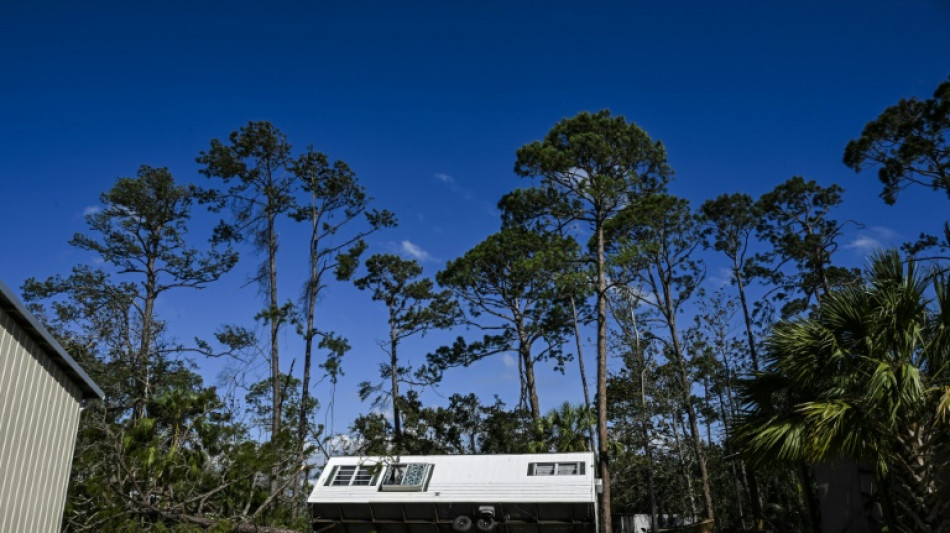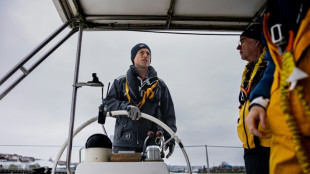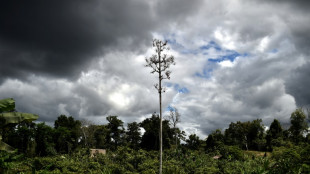

Storm Helene kills 44, threatens more 'catastrophic' flooding
Nearly four million Americans were still in the dark and many faced torrential flooding on Saturday, authorities said, as powerful storm Helene marched across eastern US states, leaving at least 44 people dead.
Emergency responders had launched massive rescue operations across multiple states since Helene slammed into Florida as a Category 4 hurricane and surged north, leaving roads, homes and businesses underwater -- many of them destroyed.
Power had been restored in some areas since night fell over the region Friday, but nearly four million customers were still without electricity across 10 states in the early hours of Saturday, according to tracker poweroutage.us, with US meteorologists warning of possible "long-duration" outages.
While Helene has weakened to a post-tropical cyclone, it has continued to wreak havoc with heavy rains that the National Hurricane Center (NHC) said would result in "catastrophic and potentially life-threatening flash and urban flooding."
More evacuations were ordered overnight into Saturday as flooding threatened to breach dams in North Carolina and Tennessee.
The National Weather Service (NWS) warned an eastern Tennessee dam was on the verge of failure and urged downstream communities to "move immediately to higher ground."
Record-breaking river flooding hit several southern states, the NHC said, with massive flooding reported in Asheville, a city in western North Carolina.
"This is one of the worst storms in modern history for parts of western North Carolina," state Governor Ray Cooper said in a briefing Friday night.
In Cedar Key, an island city of 700 people just off Florida's northwest coast, the full destructive force of the hurricane was on view.
Several pastel-colored wooden homes were completely destroyed, victims of storm surge and ferocious winds.
"I've lived here my whole life, and it breaks my heart to see it," said Gabe Doty, superintendent of Cedar Key's water and sewer district. "We've not really been able to catch a break around here."
- 'Gut punch' -
Up to 12 inches (30 centimeters) of rain was forecast in the Appalachian mountains, with isolated spots even receiving 20 inches.
In South Carolina at least 20 people have died, including two firefighters, officials said. Among the deaths were six residents of Spartanburg County, according to county coroner Rusty Clevenger.
Georgia Governor Brian Kemp's office confirmed 15 people were killed in his state, including an emergency responder. Kemp warned that the city of Valdosta had identified 115 heavily damaged structures with multiple people trapped inside.
Florida's toll stood at seven. Governor Ron DeSantis said the damage from Helene exceeded that of hurricanes Idalia and Debby, which both hit the same Big Bend region southeast of Tallahassee in the last 13 months.
"It's a real gut punch to those communities," DeSantis told Fox News.
In Perry, near where Helene slammed ashore bearing winds of 140 miles (225 kilometers) per hour, houses lost power and the gas station was flattened.
"I am Floridian, so I'm kind of used to it, but it was real scary at one point," said Larry Bailey, 32, who sheltered in his small wooden home all night with his two nephews and sister.
Four hundred miles to the north in the Tennessee town of Erwin, a dramatic rescue operation unfolded, as more than 50 patients and staff were trapped on a hospital roof as floodwaters raged around them, local television footage showed. Helicopters were deployed in the rescue.
In neighboring Virginia, Governor Glenn Youngkin confirmed one fatality related to Helene. "This storm is not over," he warned in a video message.
Local media reported multiple deaths in North Carolina.
- 'It looks bad' -
With typhoon Yagi battering Asia, storm Boris drenching Europe, a deadly new hurricane damaging Mexico's Acapulco and extreme flooding in the Sahel, September so far has been an unusually wet month around the world.
Scientists link some extreme weather events to human-caused global warming.
"Helene traveled over exceptionally warm ocean waters in the Gulf of Mexico," Andra Garner, a climate scientist at Rowan University in New Jersey, told AFP.
"It's likely that those extra warm ocean waters played a role in Helene's rapid intensification."
"Storm surges are getting worse," Garner said, "because our sea levels are rising as we warm the planet."
In the impact zone, residents had been warned of "unsurvivable" storm surge.
President Joe Biden and state authorities had urged people to heed official evacuation warnings before Helene hit, though some chose to stay in their homes to wait out the storm.
Vice President Kamala Harris said she and Biden "will continue to monitor the situation closely," adding the administration has mobilized 1,500 personnel to support impacted communities.
The head of the Federal Emergency Management Agency, Deanne Criswell, said "over 600 rescues" have been conducted.
T.Peeters--JdB



